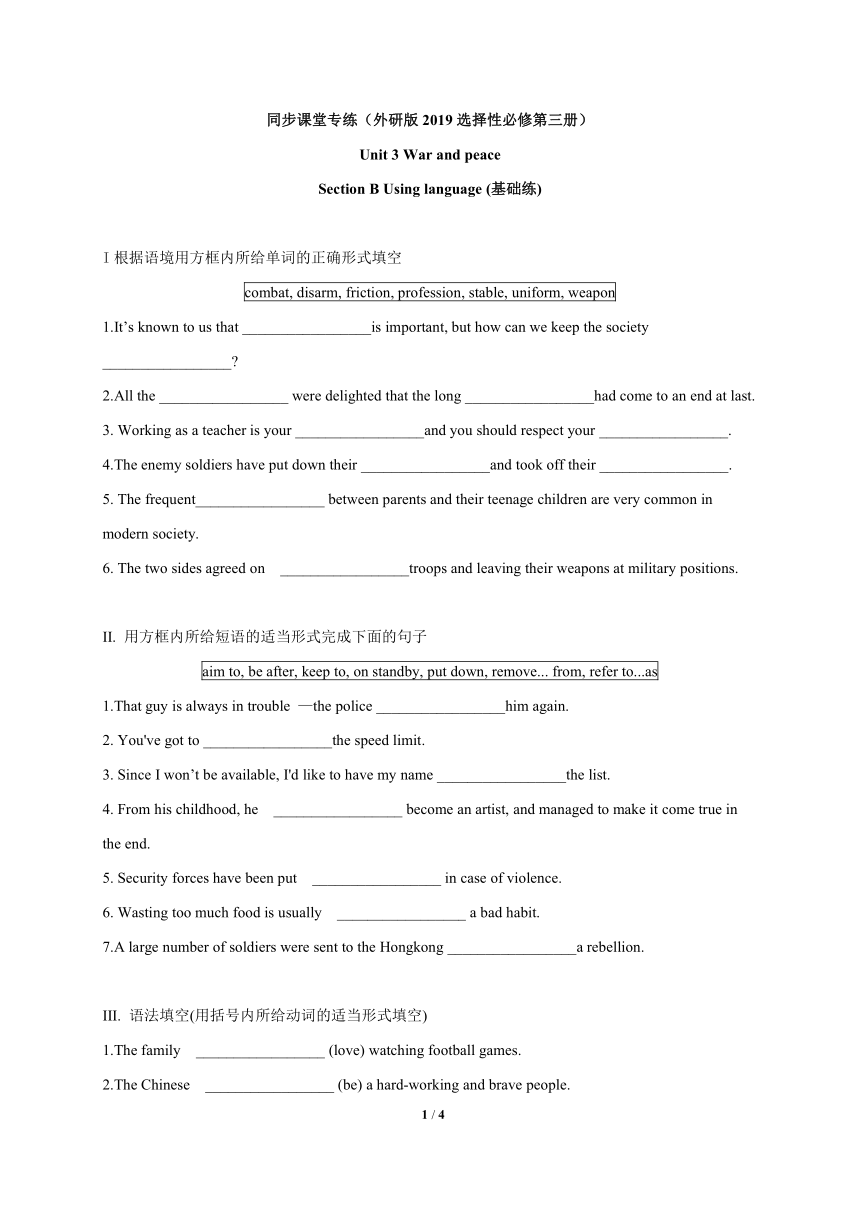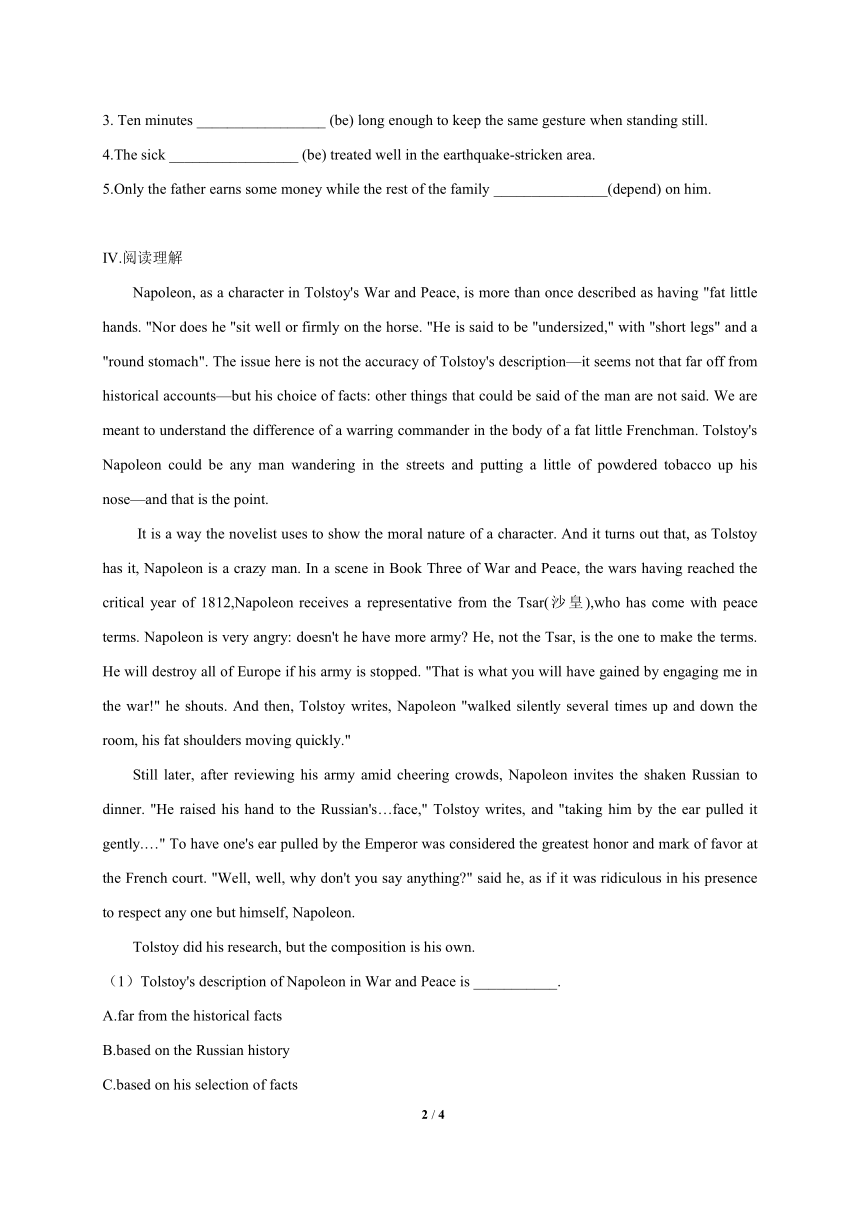外研版(2019)选择性必修第三册 Unit3 War and peace Using language 同步课堂基础练(含解析)
文档属性
| 名称 | 外研版(2019)选择性必修第三册 Unit3 War and peace Using language 同步课堂基础练(含解析) |  | |
| 格式 | docx | ||
| 文件大小 | 23.7KB | ||
| 资源类型 | 教案 | ||
| 版本资源 | 外研版(2019) | ||
| 科目 | 英语 | ||
| 更新时间 | 2023-03-05 19:44:26 | ||
图片预览


文档简介
同步课堂专练(外研版2019选择性必修第三册)
Unit 3 War and peace
Section B Using language (基础练)
I根据语境用方框内所给单词的正确形式填空
combat, disarm, friction, profession, stable, uniform, weapon
1.It’s known to us that _________________is important, but how can we keep the society _________________
2.All the _________________ were delighted that the long _________________had come to an end at last.
3. Working as a teacher is your _________________and you should respect your _________________.
4.The enemy soldiers have put down their _________________and took off their _________________.
5. The frequent_________________ between parents and their teenage children are very common in modern society.
6. The two sides agreed on _________________troops and leaving their weapons at military positions.
II. 用方框内所给短语的适当形式完成下面的句子
aim to, be after, keep to, on standby, put down, remove... from, refer to...as
1.That guy is always in trouble —the police _________________him again.
2. You've got to _________________the speed limit.
3. Since I won’t be available, I'd like to have my name _________________the list.
4. From his childhood, he _________________ become an artist, and managed to make it come true in the end.
5. Security forces have been put _________________ in case of violence.
6. Wasting too much food is usually _________________ a bad habit.
7.A large number of soldiers were sent to the Hongkong _________________a rebellion.
III. 语法填空(用括号内所给动词的适当形式填空)
1.The family _________________ (love) watching football games.
2.The Chinese _________________ (be) a hard-working and brave people.
3. Ten minutes _________________ (be) long enough to keep the same gesture when standing still.
4.The sick _________________ (be) treated well in the earthquake-stricken area.
5.Only the father earns some money while the rest of the family _______________(depend) on him.
IV.阅读理解
Napoleon, as a character in Tolstoy's War and Peace, is more than once described as having "fat little hands. "Nor does he "sit well or firmly on the horse. "He is said to be "undersized," with "short legs" and a "round stomach". The issue here is not the accuracy of Tolstoy's description—it seems not that far off from historical accounts—but his choice of facts: other things that could be said of the man are not said. We are meant to understand the difference of a warring commander in the body of a fat little Frenchman. Tolstoy's Napoleon could be any man wandering in the streets and putting a little of powdered tobacco up his nose—and that is the point.
It is a way the novelist uses to show the moral nature of a character. And it turns out that, as Tolstoy has it, Napoleon is a crazy man. In a scene in Book Three of War and Peace, the wars having reached the critical year of 1812,Napoleon receives a representative from the Tsar(沙皇),who has come with peace terms. Napoleon is very angry: doesn't he have more army He, not the Tsar, is the one to make the terms. He will destroy all of Europe if his army is stopped. "That is what you will have gained by engaging me in the war!" he shouts. And then, Tolstoy writes, Napoleon "walked silently several times up and down the room, his fat shoulders moving quickly."
Still later, after reviewing his army amid cheering crowds, Napoleon invites the shaken Russian to dinner. "He raised his hand to the Russian's…face," Tolstoy writes, and "taking him by the ear pulled it gently.…" To have one's ear pulled by the Emperor was considered the greatest honor and mark of favor at the French court. "Well, well, why don't you say anything " said he, as if it was ridiculous in his presence to respect any one but himself, Napoleon.
Tolstoy did his research, but the composition is his own.
(1)Tolstoy's description of Napoleon in War and Peace is ___________.
A.far from the historical facts
B.based on the Russian history
C.based on his selection of facts
D.not related to historical details
(2)Napoleon was angry when receiving the Russian representative because ________.
A.he thought he should be the one to make the peace terms
B.the Tsar's peace terms were hard to accept
C.the Russians stopped his military movement
D.he didn't have any more army to fight with
(3)Tolstoy intended to present Napoleon as a man who is __________________.
A.ill-mannered in dealing with foreign guests
B.fond of showing off his iron will
C.determined in destroying all of Europe
D.crazy for power and respect
(4)What does the last sentence of the passage imply
A.A writer doesn't have to be faithful to his findings.
B.A writer may write about a hero in his own way.
C.A writer may not be responsible for what he writes.
D.A writer has hardly any freedom to show his feelings.
参考答案
I.1. stability, stable 2. combatants, combat
3. profession, professionalism 4. weapons, uniforms
5. frictions 6. disarming
lI.l.are after 2.keep to 3. removed from 4. aimed to
5. on standby 6. referred to as 7. to put down
III.1.love 2. is
3.is 4.are 5. depend
【答案】 (1)C
(2)A
(3)D
(4)A
【解析】本文是一篇说明文,介绍了著名作家Tolstoy笔下的拿破仑的形象,告诉我们作家所写的内容与他研究的内容可以是不一致的。
【点评】本题考点涉及细节理解和推理判断两个题型的考查,是一篇文化类阅读。考生需要准确捕捉细节信息,并根据上下文进行逻辑推理,从而选出正确答案。
2 / 2
Unit 3 War and peace
Section B Using language (基础练)
I根据语境用方框内所给单词的正确形式填空
combat, disarm, friction, profession, stable, uniform, weapon
1.It’s known to us that _________________is important, but how can we keep the society _________________
2.All the _________________ were delighted that the long _________________had come to an end at last.
3. Working as a teacher is your _________________and you should respect your _________________.
4.The enemy soldiers have put down their _________________and took off their _________________.
5. The frequent_________________ between parents and their teenage children are very common in modern society.
6. The two sides agreed on _________________troops and leaving their weapons at military positions.
II. 用方框内所给短语的适当形式完成下面的句子
aim to, be after, keep to, on standby, put down, remove... from, refer to...as
1.That guy is always in trouble —the police _________________him again.
2. You've got to _________________the speed limit.
3. Since I won’t be available, I'd like to have my name _________________the list.
4. From his childhood, he _________________ become an artist, and managed to make it come true in the end.
5. Security forces have been put _________________ in case of violence.
6. Wasting too much food is usually _________________ a bad habit.
7.A large number of soldiers were sent to the Hongkong _________________a rebellion.
III. 语法填空(用括号内所给动词的适当形式填空)
1.The family _________________ (love) watching football games.
2.The Chinese _________________ (be) a hard-working and brave people.
3. Ten minutes _________________ (be) long enough to keep the same gesture when standing still.
4.The sick _________________ (be) treated well in the earthquake-stricken area.
5.Only the father earns some money while the rest of the family _______________(depend) on him.
IV.阅读理解
Napoleon, as a character in Tolstoy's War and Peace, is more than once described as having "fat little hands. "Nor does he "sit well or firmly on the horse. "He is said to be "undersized," with "short legs" and a "round stomach". The issue here is not the accuracy of Tolstoy's description—it seems not that far off from historical accounts—but his choice of facts: other things that could be said of the man are not said. We are meant to understand the difference of a warring commander in the body of a fat little Frenchman. Tolstoy's Napoleon could be any man wandering in the streets and putting a little of powdered tobacco up his nose—and that is the point.
It is a way the novelist uses to show the moral nature of a character. And it turns out that, as Tolstoy has it, Napoleon is a crazy man. In a scene in Book Three of War and Peace, the wars having reached the critical year of 1812,Napoleon receives a representative from the Tsar(沙皇),who has come with peace terms. Napoleon is very angry: doesn't he have more army He, not the Tsar, is the one to make the terms. He will destroy all of Europe if his army is stopped. "That is what you will have gained by engaging me in the war!" he shouts. And then, Tolstoy writes, Napoleon "walked silently several times up and down the room, his fat shoulders moving quickly."
Still later, after reviewing his army amid cheering crowds, Napoleon invites the shaken Russian to dinner. "He raised his hand to the Russian's…face," Tolstoy writes, and "taking him by the ear pulled it gently.…" To have one's ear pulled by the Emperor was considered the greatest honor and mark of favor at the French court. "Well, well, why don't you say anything " said he, as if it was ridiculous in his presence to respect any one but himself, Napoleon.
Tolstoy did his research, but the composition is his own.
(1)Tolstoy's description of Napoleon in War and Peace is ___________.
A.far from the historical facts
B.based on the Russian history
C.based on his selection of facts
D.not related to historical details
(2)Napoleon was angry when receiving the Russian representative because ________.
A.he thought he should be the one to make the peace terms
B.the Tsar's peace terms were hard to accept
C.the Russians stopped his military movement
D.he didn't have any more army to fight with
(3)Tolstoy intended to present Napoleon as a man who is __________________.
A.ill-mannered in dealing with foreign guests
B.fond of showing off his iron will
C.determined in destroying all of Europe
D.crazy for power and respect
(4)What does the last sentence of the passage imply
A.A writer doesn't have to be faithful to his findings.
B.A writer may write about a hero in his own way.
C.A writer may not be responsible for what he writes.
D.A writer has hardly any freedom to show his feelings.
参考答案
I.1. stability, stable 2. combatants, combat
3. profession, professionalism 4. weapons, uniforms
5. frictions 6. disarming
lI.l.are after 2.keep to 3. removed from 4. aimed to
5. on standby 6. referred to as 7. to put down
III.1.love 2. is
3.is 4.are 5. depend
【答案】 (1)C
(2)A
(3)D
(4)A
【解析】本文是一篇说明文,介绍了著名作家Tolstoy笔下的拿破仑的形象,告诉我们作家所写的内容与他研究的内容可以是不一致的。
【点评】本题考点涉及细节理解和推理判断两个题型的考查,是一篇文化类阅读。考生需要准确捕捉细节信息,并根据上下文进行逻辑推理,从而选出正确答案。
2 / 2
